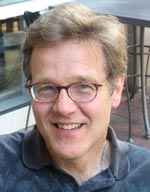President's Column
Dan P. McAdams
Northwestern University

It is an honor to serve as the President of the Association for Research in Personality (ARP). Let me thank all of you who voted for me in last year's election. And thanks, too, to those of you who, like me, voted for my worthy opponent, under the (well-founded) belief that she was the better qualified candidate and would perform this important role in a superior manner.
One of my favorite songs in the hit musical, Hamilton, is "In the Room Where It Happens." Perhaps you have heard it. Sung by an envious Aaron Burr (who wishes he had been in the room), the song recounts a famous meeting between Alexander Hamilton, Thomas Jefferson, and James Madison. Behind close doors, the three come to a grand agreement regarding the establishment of (1) a new financial system for the United States and (2) the location of the new nation's future capital.
I was lucky enough to be "in the room where it happened" with respect to the founding of ARP.
In the summer of 1999, the group pictured in the photo below met at the Minary Conference Center at Squam Lake, New Hampshire. Funded by Dartmouth College and hosted by Jay Hull and Todd Heatherton, the weekend retreat was ostensibly dedicated to serious discussion about "Issues in Personality Research and Theory." My memory of the weekend is pretty fuzzy, but I do recall two things well. First, I played a lot of tennis on the weathered clay courts that could be found on the outskirts of the property. Second, I remember how ARP came to be.

Pictured here are those who were in, or near, the room where it happened, at Squam Lake, New Hampshire, July, 1999.
From left to right:
Back Row - Susan Nolen-Hoeksema, David Buss, Hank Rothgerber, Robert Kleck, David Funder, Doug Kenrick, Reginald Adams, Dan McAdams, and Mark Snyder.
Photo courtesy of Jay Hull.
It was after a few too many beers one evening, when somebody floated the idea of personality psychologists' banding together into an organization. There was palpable excitement about the proposal among some people in the room, but also a fair amount of anxiety. Would there be enough of "us" to form a viable tribe? If we indeed organized, what would we, in fact, do? Set up scientific meetings? Exchange data? Form support groups? I ran around the room with a clipboard asking people to generate names of prospective members - psychologists all over the world who were already bona fide personality psychologists, or those who could maybe be converted under the right social-psychological conditions. I wrote down probably 90 to 100 names. After David Watson left the room and then returned with another drink, he learned that a group of us had voted him to be the first president of this new association.
In the subsequent year, an expanded executive committee worked to get ARP off the ground. David Watson publicly announced the formation of ARP at the lunch break during the Personality Preconference at the very first meeting of the Society for Personality and Social Psychology (SPSP), in Nashville, February of 2000. Membership letters were sent out a few months later. The organization's first public act was hosting the 2001 Personality Preconference at the San Antonio SPSP meeting, in 2001.
I am very happy to have been in the room where it first happened. And I am even happier to have witnessed our growth as an organization over the intervening years. Like many good ideas and important movements (and, alas, some bad ones, too), ARP began as a fantasy, partly induced by alcohol intake, but it has developed into a robust intellectual force in psychological science today. When we began, we worried that we might not have enough people to form a critical mass. Now we are looking forward to our fifth stand-alone conference, to be held in Sacramento, California in June of 2017.
Ten months in, I don't feel I have messed things up too badly yet, as President of ARP. Thankfully, I inherited the job from Dan Ozer, who continues to serve the organization as distinguished Past President, and I am blessed to work with fabulous ARP Board members and with our brilliant and dedicated Executive Officer, Rebecca Shiner. ARP continues to flourish. Over the past year, the ARP Board, led by Tom Widiger, drafted a statement underscoring the critical importance of personality science in response to a call from NIMH for public commentary on the state of mental health research. Our journals - Journal of Research in Personality and Social Psychological and Personality Science (which we share with three other scientific organizations) - continue to publish cutting edge research on personality processes, individual differences, and other topics of central concern for our field. In their research, their service, and their advocacy, members of ARP continue to respond in thoughtful and creative ways to the challenges facing psychological science today, including the replicability crisis.
Looking ahead, Wiebke Bleidorn (with some assistance from me) is the Program Chair for our upcoming conference in Sacramento, and Rick Robins will serve as a local host while also organizing a pre-conference session on methodology. Many thanks to Josh Jackson, Katie Corker, Jennifer Tackett, and Chris Soto for volunteering to serve on the 2017 Conference Committee. I hope this conference will be our best and biggest so far. Looking even further ahead, the location for the 2019 ARP Conference has been chosen. It will happen in Grand Rapids, MI, which, among its many notable attractions, bills itself as Beer City USA. Seems a fitting place, somehow, to mark the 20th anniversary of the founding of ARP.